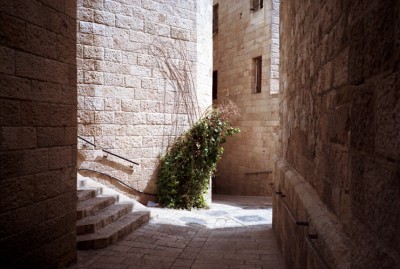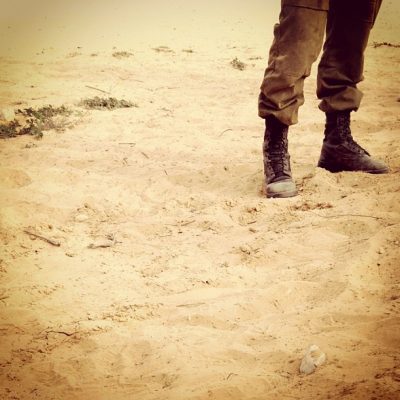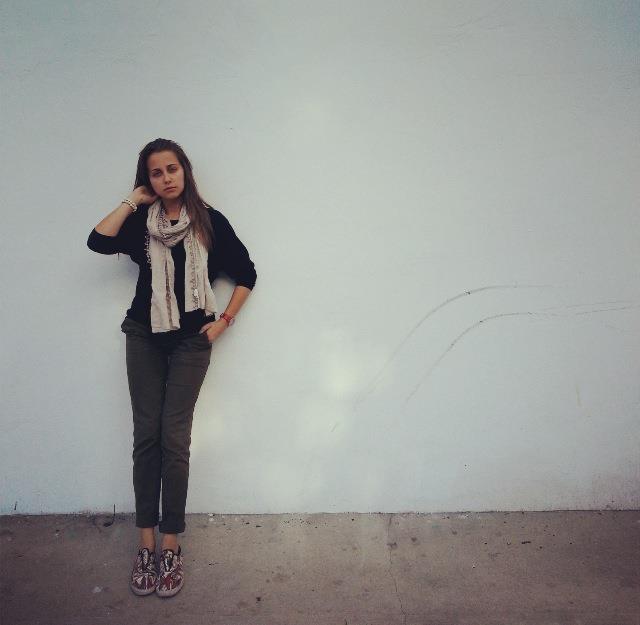
On the first day of Ulpan, Jenna Gang showed us the tattoo of her Hebrew name printed on the back of her neck. From then on, we called her Yosefa. We lived together in a cramped apartment in Jerusalem, she the established New York City photographer and I the aspiring California writer, both participating on a post-college arts program run by the World Union of Jewish Students.
Most things about Yosefa were striking— her looks, her photographs, her passionate personality that contradicted her lackadaisical body language—but what struck me the most was her love of cats. Israel was perfect for her. In case you didn’t know, Israel is overrun with strays. It’s a common Jerusalem trick to throw one bag of garbage into a dumpster and get five malnourished kittens in return. On field trips we would hear a shrill, “Kitty!” from the back of the group and before anyone could stop it Yosefa was petting some mangy cat and snapping its picture. In the beginning, the guys laughed at her, but by the end they were instagramming cats too. She was a trend setter. Most mornings I saw her leave our apartment stuffing a camera into her canvas bag.
During my recent interview with Yosefa I asked whether she knew where she was going those days or just wandered. “The first couple weeks were full of taking touristy pictures that I would never show anyone,” she told me. “I needed to get it out of my system. So I could say yes, I was at the Western Wall, yes, I was in Eilat. When you’re in a new place where you don’t speak the language it’s complicated. In New York, I can tell when someone’s going to steal my camera. I know what streets not to go down. In Israel, I wasn’t familiar with the culture yet and had to act differently. I didn’t want to put myself in danger.”
Yosefa swears that her photographs aren’t political. Most of them are people-less and have very little, if any, social commentary attached. Her work is an important, vital breath of fresh air. It focuses on an aspect of Israel rarely publicized: its ordinary, day-to-day life. Though she would never call herself this, in many ways she’s a purist. Her compositions focus on topography or how sunlight hits a building. She is interested in looking at the land of Israel, literally.

“When you look at America – say the Grand Canyon in the Southwest – people are in awe because it’s a natural wonder,” she explained. “The Dead Sea is the same, but people don’t view it that way.” She’s right. Most people haven’t been on a bus cutting through the Negev at night and seen how the Dead Sea can look like a saucer of milk in moonlight. They think of it as vacuous space on a military map.
Yosefa admitted to me that her memory isn’t as keen as it should be. She keeps a five year journal and takes photographs – lots and lots of photographs – to aid her. Maybe that’s why her images focus on subtle moments. She wishes to recollect mood and thought just as much as time and place.
With renewed conflict in Israel, I was curious whether Yosefa wanted to go back. She had previously seriously considered making Aliyah. She admitted that when the tension escalated, all she wanted to do was be there. A friend once told me how to spot people who truly love you. When something goes wrong in your life and there’s a fire, they’re the ones running in while everyone else is running out. I think the same applies for love of a country. Though I knew her pictures were apolitical, I was curious whether Yosefa wanted to document the current events.
“I try to put my political beliefs aside,” she simply said. “I’m going to photograph what I always photograph. When you watch the news you never get just the facts. There’s always a slant, always a bias. I’d like to give people a picture with just the facts.”
During the WUJS program I watched Yosefa’s views change from more liberal to conservative. I wondered whether this change in perspective influenced the kinds of pictures she took. She wanted to know what I meant by liberal and for a minute I didn’t know how to answer, because there are so many answers as it pertains to Israel. So she asked me what I meant by conservative. This was easier.

I responded, “That Israel needs to be defensive and always retaliate. That military might is a necessity and support Israel’s hardcore military stance. As you got more and more information, did that affect the kinds of pictures you wanted to take?”
“My political views drastically changed. Prior to living in Israel, I couldn’t care less about politics. I really didn’t pay attention. In Israel I met many young people aware of global news. I understood how what’s happening across the world pertains to me. Now I have the New York Times on my phone and check constantly.”
“Recently you interviewed to be the assistant of a notable fine art photographer. You told me you were worried because they had photographed one of the leaders of Hamas and you didn’t know what you would do if they did it again. What would you do if you were asked to photograph the leader of Hamas now?”
She pauses and readjusts her glasses. “I would definitely take the picture.”
“You would.”
“I would not portray him either way, as a murderer or humanitarian. I would try to capture the facts.”
“What are the facts?”
“His facial features.”
At the end of our conversation she shows me a picture of a crazy cat lady she found on the subway in New York. There’s a cat in a baby stroller enshrined by photographs for sale of other various cats.
“Is this you if things don’t work out?” I joke.
She laughs, “Oh no.”

